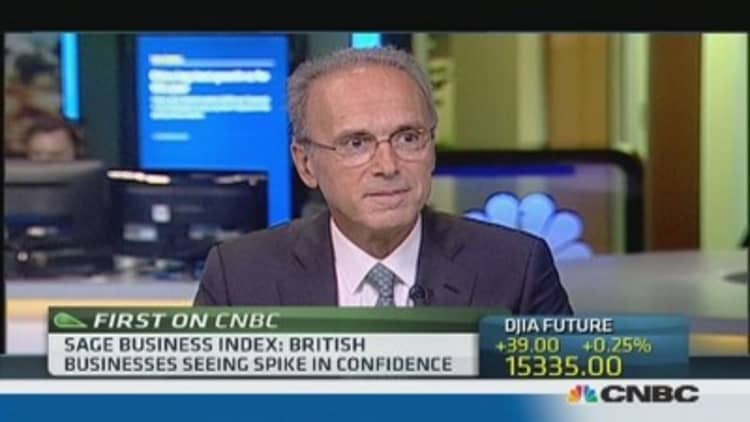
Business confidence among small and medium-sized firms (SMEs) across the globe is at a three year high, according to a global survey of businesses, but access to credit and risk aversion remain a problem.
The Sage Business Index Index 2013, an annual global measures of confidence across SMEs, showed that confidence scores were at their highest level since the index began in 2011 as the global economy started to emerge from a prolonged period of economic crisis.
The survey of almost 12,000 businesses across 17 countries was conducted by online interviews. Asked to plot their confidence on a scale of 1-100 on three core areas affecting their business, confidence in their firms' prospects had risen 5.5 points to 62.01 from a year ago. Confidence in their country's economy had risen 6.38 points to 48.85.
Reflecting that businesses were optimistic about a continuing recovery too, confidence in the global economy had risen 6.01 points to 48.60.
Guy Berruyer, chief executive of the Sage Group which carried out the survey, told CNBC that while the results were "good news," businesses in certain countries such as the U.K. still remained cautious on taking risks – an essential component of potential success in business.
"The only word of caution is that the attitude to risk remains quite conservative, in particular in the U.K. compared to other countries. I think that in a business environment where things are getting better for small businesses to take risk and to invest is important," he said.
"They can learn and try new things -they may fail but at least they will increase their confidence. Doing nothing is a risk in itself," he told CNBC Europe's "Squawk Box."
Many businesses have suffered or crumbled during the economic crisis and banks have become increasingly averse to lend to them. Such caution prevails despite U.K. government schemes such as "Funding for Lending" that have attempted to encourage banks to lend to consumers and businesses again.
In many European countries small and medium-sized businesses – or the "Mittelstand" as they're known in Germany -- constitute the backbone of the economy. Italy, for instance, has an estimated 5 million enterprises accounting for 80 percent of Italy's gross domestic product.
(Read more: Banks and state abandon 'oxygen starved' Italian firms)
Indeed, in the 28-nation European Union, some 23 million SMEs provide around 75 million jobs, according to the European Commission.
It defines small businesses as those with less than 50 employees and a turnover of less than 2 million euros ($2.73 million) while medium-sized firms have less than 250 staff and a turnover of less than 50 million euros a year.
(Read more: The secret recipe of German economic success)
Most businesses questioned in the Sage survey felt that banks and governments had been slow to respond to, and support, growing business positivity and that more should be done to encourage investment in small businesses the world over.
"There are two things that businesses complain about over and over again and that's access to funding and bureaucracy," Berruyer said, noting that U.S. companies complained a lot less than their European counterparts about a lack of access to funding.
"What's different about the U.S. to Europe is that sources of funding are far more diversified in the U.S. - it's not only banks that can provide funding but peer-to-peer lending, crowd funding – I think that diversifying the source of funding is the best thing that can happen."
- By CNBC's Holly Ellyatt, folow her on Twitter @HollyEllyatt
Follow us on Twitter: @CNBCWorld


